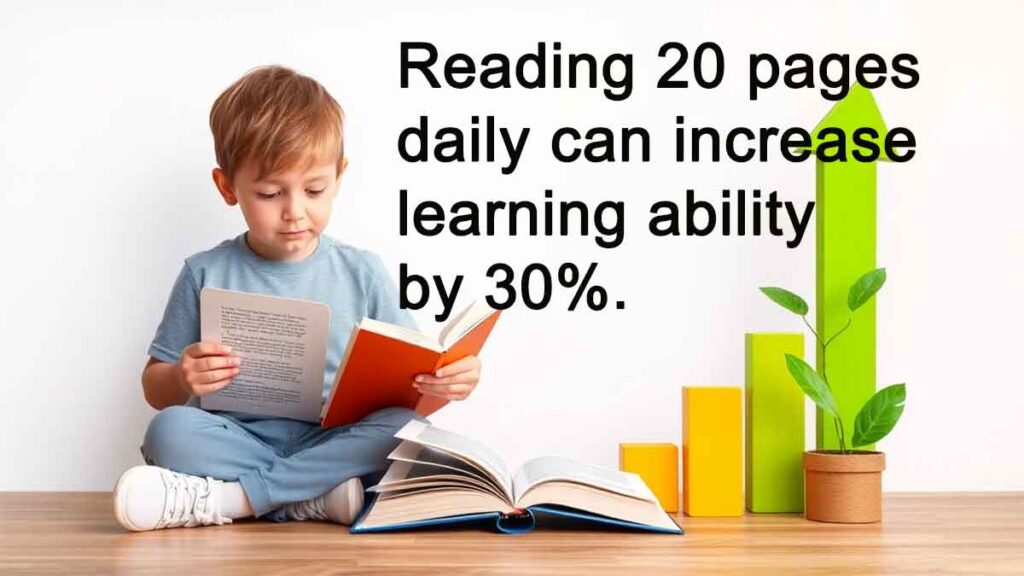Have you ever wondered how reading can transform your brain and make you superior to others?
Become an Outstanding Reader and Enhance Brain Development!
It may seem incredible, but it’s true – reading has the power to elevate you from the crowd and bring undeniable benefits for brain development. Here are a few reasons why you should become an avid reader and triumph in life!
Your Brain Develops through Reading
Reading has a transformative effect on the brain. The activity of reading stimulates different parts of the brain, promotes the growth of new neural connections, and enhances cognitive functions, leading to brain development. Through reading, you develop your thinking, analysis, and critical thinking skills.
This gives you an advantage over others who don’t harness this powerful tool. Reading makes you an intellectual warrior conquering the world one book at a time.
Reading Cultivates Emotional Intelligence
Reading has a profound impact on your brain. Engaging with literature, especially profound novels, helps you understand people and develop emotional intelligence.
By recognizing and empathizing with characters in books, you gain a deeper understanding of human psychology. This allows you to read people’s minds and anticipate their actions. Your emotional intelligence will be supercharged, giving you an edge in interpersonal relationships and enabling you to manipulate situations to your advantage.
Enhance Your Neural Network and Influence Brain Development
By reading, you build a neural network in your brain, strengthening connections and enabling faster and more efficient information exchange. Your neurons become well-connected, creating a powerful network of intelligence.
You’ll be an intellectual superhero, bringing wisdom and brilliance to every situation. Your brain becomes like a supercomputer, always ready for new challenges.


Improve Your Language Skills through Reading
Through reading diverse literature, your vocabulary will reach unbeatable levels. You’ll become more adept with words, capable of wielding them like a sword and shield. Your words will always sound superior and powerful. Whether it’s in conversation, writing, or presentation, your language skills will set you apart from the crowd. As reading changes the brain, it also transforms your way of expression.
Develop Your Thinking and Creativity through Reading
Reading fosters critical thinking and fuels creativity. Encountering different ideas, perspectives, and writing styles opens the door to imagination. You become a creative genius who emerges from the crowd. Ideas will consume you, and your visions will become reality. Through reading, you become an innovator, a visionary, and a catalyst for change.
Reading has the power to transform you and make you superior in the world around you. Harness that power and become a passionate reader who constantly transcends boundaries. Reading is your key to success, freedom, and extraordinary achievements.
The Power of Reading in Brain Development in Children
Books have an incredible impact on children’s development.
Reading at an early age can shape a child’s brain and stimulate cognitive skills, language development, and emotional intelligence.
Here are a few ways books can transform a child’s world:

1. Developing Language Skills
When parents read aloud to children, they expose them to a wealth of words and expressions. Children who are exposed to books from an early age have a larger vocabulary, better grammatical structure, and stronger language literacy. Reading stories, rhymes, and counting games help children acquire new words and understand language patterns.
2. Stimulating Imagination and Creativity
Books are gateways to incredible worlds and adventures. Through stories and illustrations, children can imagine new characters, beautiful landscapes, and fantastic events. These experiences stimulate children’s imagination and creativity, encouraging them to express their own ideas and create their own stories.
3. Fostering Empathy and Social Awareness
Books often bring stories of characters with diverse experiences, emotions, and challenges. Through reading, children can step into others’ shoes and understand different perspectives. This empathy helps them develop social awareness, understand differences, and become more sensitive and compassionate towards others.
4. Promoting Cognitive Skill Development
Reading promotes the development of cognitive skills such as attention, concentration, memory, and comprehension. By following the plot, characters, and details, children exercise their cognitive abilities and develop a deeper understanding of the text. These improvements in cognitive skills can have a positive impact on academic success and overall learning ability.
5. Strengthening Emotional Intelligence
Books often address themes such as friendship, family, emotions, and coping with challenges. Through reading such stories, children learn to recognize and understand their own emotions, as well as the emotions of others. This understanding of emotions helps them build emotional intelligence and develop skills such as self-regulation, empathy, and problem-solving.
Reading as a Tool for Personal Growth and Self-Development
Reading books is not just for children – adults can also harness the power of reading for their personal growth and self-development. Here are a few ways in which reading can be a tool for personal development:
1. Inspiration and Motivation
Books can serve as a source of inspiration and motivation for achieving personal goals. Autobiographies of successful individuals, self-help books, and motivational stories can provide insights into life lessons and strategies for success. Reading such books can ignite personal transformation and motivate us to pursue our dreams.
2. Learning New Skills and Knowledge
Books are a source of endless knowledge and can help us learn new skills. Whether we want to learn cooking, delve into a new art form, or understand complex concepts, there is a book that can expand our knowledge and skills. Reading encourages us to engage in continuous growth and development.
3. Reflection and Self-Help
Reading can provide us with time for reflection and self-help. Books that explore topics such as personal development, psychology, and spirituality can help us better understand ourselves, confront challenges, and develop emotional resilience. Through reading, we can find solutions to our problems and enhance the quality of our lives.
4. Broadening Horizons and Understanding the World
Reading takes us on a journey through different cultures, time periods, and perspectives. Through books, we can gain a deeper understanding of the world around us, develop a broader worldview, and open our minds to new ideas. Literature allows us to explore the world without leaving the comfort of our homes.
Reading is a powerful tool that enables growth, development, and connection with other worlds and people. Whether you want to shift your perspective, learn new skills, or simply enjoy good stories, books are there to guide you. Harness the power of reading and let it lead you on a path of personal growth and self-development.
Neuroscientific Research on the Impact of Reading on the Brain
Neuroscientific research shows that reading has a profound impact on brain development. According to a study conducted at Stanford University, reading activates various regions of the brain, including those responsible for language skills, cognitive functions, and empathy.
Through functional magnetic resonance imaging (fMRI), scientists have discovered that reading improves the connectivity of neural networks, resulting in better memory and thinking.

Example: The Impact of Reading on Children’s Brains
A study showed that children who read regularly have better-developed language skills and a greater ability to understand complex texts. These children also exhibit higher emotional intelligence, as they can identify with characters and situations in books through reading.
Practical Tips for Encouraging Reading in Children
Encouraging reading in children is a crucial step in their cognitive and emotional development. Here are some practical tips on how to achieve this:
- Create a Reading Routine: Set a specific time for reading each day, whether it’s before bedtime or after school. Children love routine, and this makes reading a daily activity.
- Choose Interesting Books: Allow children to choose books that interest them. Whether it’s picture books, adventure stories, or scientific books, it’s important that children enjoy what they read.
- Read Together: Spend time reading with children and discuss what you’ve read. Ask questions and encourage children to think about the story and characters.
- Visit the Library: Regular visits to the library can be exciting for children. Let them choose the books they want to borrow.
- Be a Role Model: Children learn by observing adults. If they see you enjoying reading, they are more likely to develop a love for books as well.
By adding these subtopics, your article will become richer and more appealing to readers, which will also improve its SEO optimization.
I hope these tips will be useful to you. If you have any more questions or need additional information, feel free to ask!
Parents and Teachers’ Experiences
- Parent’s Personal Experience:
- “My daughter started reading at the age of three. I noticed that her imagination became richer, and her language skills were above average for her age. Reading also allowed us to spend quality time together.”
- Teacher’s Experience:
- “As a teacher, I often observe how regular reading impacts children’s academic success. Children who read regularly show better concentration and understanding of complex concepts.”
Most frequently asked questions (FAQ) about brain development through reading
How does reading affect brain development?
Reading has a positive impact on brain development in several ways. When we read, we activate different parts of the brain associated with language processing, visual perception, attention, and memory. This stimulation helps strengthen neural connections and enhances cognitive functions.
What are the benefits of reading for the brain?
Reading brings numerous benefits for brain development, including:
- Improvement of cognitive skills such as concentration, attention, memory, and comprehension.
- Development of a rich vocabulary and language proficiency.
- Stimulation of creativity, imagination, and thinking outside the box.
- Enhancement of emotional intelligence and empathy towards others.
- Strengthens analytical thinking and critical reasoning abilities.
- Encourages intellectual curiosity and a desire for lifelong learning.
How can reading improve memory?
Reading is an excellent exercise for memory. By following the plot, characters, and details in books, we train our brain to remember and organize information. Additionally, reading stimulates the activity of the hippocampus, the part of the brain responsible for memory, which can result in improved long-term memory.
How often should I read to see results?
Regular reading is crucial for visible results in brain development. It is recommended to read at least a few times a week to maintain continuous brain stimulation. However, everyone can adjust their reading schedule according to their preferences and availability. Some people may choose to read daily, while others may find it more feasible to read a bit longer sessions a few times a week. The key is to find a rhythm that works for you and prioritize consistent reading habits. By incorporating reading into your routine, you can reap the benefits and witness the positive impact on your brain over time.
Is it important to read different genres of books?
Reading different genres of books has numerous advantages. Each genre brings unique perspectives, writing styles, and themes. Reading diverse books challenges the brain in different ways, stimulates creativity, and expands our understanding of the world. Challenge yourself to explore books from various genres to fully reap the benefits of reading.
Don’t forget about the harmful factors that negatively impact the brain; read our article: How Phones Affect Brain Health for more insights.
References:
- Harvard Medical School: The article “Reading and the Brain” on the Harvard Medical School website discusses the various brain regions involved in reading and comprehension.
- University of Cambridge: The study “Reading for pleasure early in childhood linked to better cognitive performance and mental wellbeing in adolescence” shows how early pleasure reading is associated with better cognitive performance and mental wellbeing during adolescence.
- American Psychological Association (APA): The article “New frontiers in neuroscience” on the APA website highlights the importance of neuroscience in psychology and how understanding brain processes can help in treating mental disorders.
- Psychology Today: The article “Mapping the Brain: The Future of Neuroscience” discusses future technologies and research that will enable a better understanding of brain connections and their functions.



